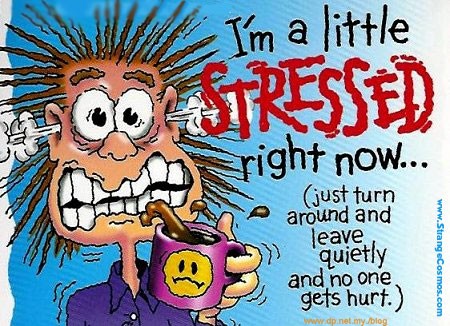What is Irritable Bowel Syndrom (IBS) and How Does Stress Impact It?
Irritable Bowel Syndrome (IBS) is a common disorder of the gastrointestinal tract that affects an estimated 10-15% of people worldwide. Stress has been identified as a major factor in the onset and exacerbation of IBS symptoms and it is definitely a trigger for the patients I see at my clinic when attending one of our super successful gut health programmes.
This month has been awareness month for both IBS and Stress, so I thought I would bring the two together in my final blog for this month.
As previously mentioned in my previous blogs IBS and Probiotics Irritable Bowel Syndrome is characterized by abdominal pain, bloating, and changes in bowel habits.

How does stress affect digestion?
Studies have shown that stress can affect the way our bodies process food and how our digestive system functions, leading to an increase in abdominal pain and other IBS symptoms. Additionally, stress can cause changes in hormone levels which can further exacerbate IBS symptoms. It is important for people with IBS to take steps to reduce stress levels in order to manage their condition more effectively.
The relationship between our brains and the digestive system is powerful, so it is not uncommon for changes in our emotional or psychological state to affect the way our gut works and could explain why we often feel ‘butterflies in the stomach’ when feeling anxious or stressed.
The communication and feedback between the gut and the brain is known as the gut-brain axis. This network consists of two parts: The sympathetic nervous system, which manages fight-or-flight responses; and the parasympathetic nervous system, which controls repair, rest and digestion.
It is believed that the enteric system functions as a third part to control the digestive system. This communication between the brain and the gut is referred to as ‘the gut-brain axis’, which helps connect emotional processes in the brain to the physical operations of our digestive system.
Recent research has been able to establish the gut-brain axis, which is the connection between the two systems. Emotions can affect how your gut functions and vice versa.
It’s important to note that although many digestive problems are related to mental health, not all of them are caused by Irritable Bowel Syndrome (IBS). Anxiety can manifest in various physical symptoms, such as stomach aches or changes in bowel movements.
Gut Bacteria and Stress
Did you know that having an imbalance in your gut bacteria is having an impact on your mental health? This is sadly not that well known, but with years of research and practice it is a major area that I have built into our programmes and is an important part of successful treatment.
Certain bacteria can affect levels of anxiety or stress through activities in the digestive tract.
A healthy balance of the ecosystem is necessary for our mental health and well-being, however when it is not balanced (dysbiosis) organisms like bacteria can lead to negative consequences.
A recent large, most comprehensive and best-validated association study to date provides further evidence for an association between gut microbes and blood metabolites (generated by host and by microbes) in patients with Major depressive disorder (MDD). (1)
They observed “that the genera Sellimonas, Eggerthella, Hungatella, and Lachnoclostridium were more abundant, while genera Ruminococcaceae…, Coprococcus, Lachnospiraceae…, Eubacterium ventriosum, Subdoligranulum, and family Ruminococcaceae were depleted in the guts of individuals with more symptoms of depression. Of these, genus Eggerthella showed statistical evidence of being involved in the causal pathway.”
These microbes are involved in synthesising important neurotransmitters, such as gamma-aminobutyric acid, butyrate, glutamate, and serotonin. It is known that Butyrate can influence depression through several routes — ie, via immune regulation, genomic transcript/translation, and/or affecting energy metabolism. So this is really critical for health to ensure these pathways are optimised.
3 Tips for Identifying & Reducing Sources of Stress in Your Life
Stress is a natural part of life and we all deal with it at different times in our day, week or life. It is normal and should not cause us problems. It can however become overwhelming if left unchecked.
Identifying and reducing sources of stress in your life is essential for maintaining mental and physical health. There are many levels of stress and many ways to address. Here are 3 simple tips to help you identify and reduce the sources of stress in your life.
One way is to take time to reflect on what is causing you stress. This could be anything from work or family pressures to financial concerns or relationship issues. Once you’ve identified the source, think about how you can reduce it. This could involve making lifestyle changes. Such as exercising more or taking up a hobby, or seeking professional help if needed.
Second, get into the habit of practising mindful living by being aware of how your thoughts and actions affect your emotions and overall well-being. Taking regular breaks throughout the day to relax and refocus will help keep stress levels low.
Third, set realistic goals for yourself that are achievable within a reasonable timeframe. Setting unrealistic expectations will only add more pressure and increase feelings of helplessness.

Dietary Changes & Supplements that Can Help with Stress & IBS Symptoms
Making changes to your diet can not only help reduce stress levels but also lessen the severity of IBS symptoms. Eating a nutrient-rich diet, and limiting processed fat and sugars is important as well as avoiding specific trigger foods. These can help reduce stress levels and improve digestion. Our 6 week elimination programme combines these all for excellent results.
Additionally, certain supplements such as probiotics, omega-3 fatty acids, magnesium, vitamin B12 and zinc may be beneficial for those suffering from stress or IBS. By making key dietary changes and taking the right supplements specifically for you, you can experience improved overall health and well-being.
We do a deep dive assessment for each patient that attends our practice. This allows 121 Dietitian programmes to be designed specifically for you, ensuring physical and mental health are addressed.
Stress Management Techniques to Help Manage Irritable Bowel Syndrome (IBS) Symptoms
There are several stress management techniques that can help to reduce IBS symptoms. Such as relaxation exercises, cognitive-behavioral therapy, and lifestyle changes.
Relaxation exercises like deep breathing, progressive muscle relaxation, and yoga can help to reduce physical tension and relieve stress.
Cognitive-behavioral therapy can help individuals identify triggers for IBS symptoms and develop strategies for managing them.
Making additional lifestyle changes such as getting regular exercise, eating a healthy diet as mentioned, and watching your caffeine intake are necessary. Along with getting sufficient sleep and reducing alcohol.
What works for IBS stress?
A multi-pronged approach is really the best way to manage IBS symptoms caused by stress.

So, what to do next about your gut health, Probiotics, mental health or anything else..
If you are suffering from gastrointestinal symptoms, ongoing stress or you wish to change your eating habits or need help optimising the foods you eat and are not sure what programme to select, please do contact us. We would love to help you or your family and friends with any nutrition-related queries big or small.
If you want to book your programme TODAY we would love to help you.
You can book a 121 Dietitian Programme today by clicking on the link below
If you have enjoyed this blog we would love you to share this with your family and friends on your social media channels. Do visit our YouTube Channel for more on keeping your health optimal.
Before you go please check out our 121 Dietitian Shop created specifically for optimising your health.
Gillian x
Links included in this description might be Amazon affiliate links. If you purchase a product or service with the links that I provide I may receive a small commission.